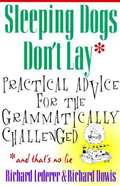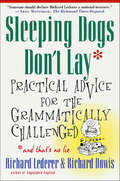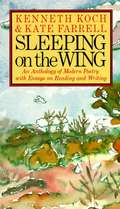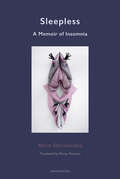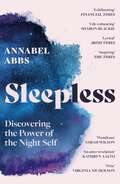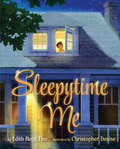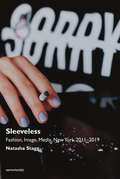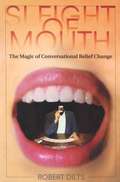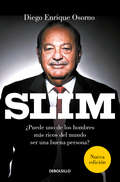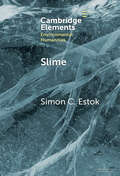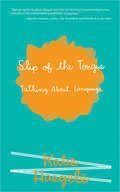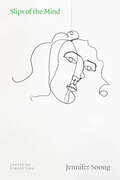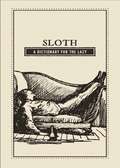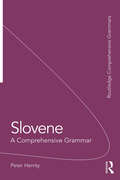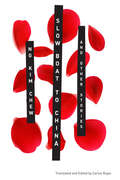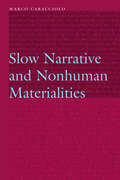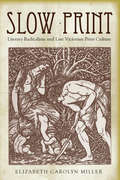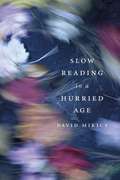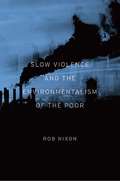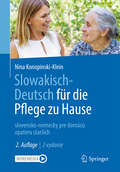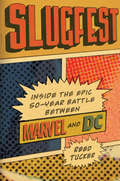- Table View
- List View
Sleeping Dogs Don't Lay: Practical Advice for the Grammatically Challenged
by Richard Lederer Richard DowisFor years Richard Lederer has enthralled fans of the English language with his keen insights, commonsense advice, and witty presentation. Now Lederer has teamed up with Richard Dowis to take readers on another journey through the world's most wonderful, albeit perplexing, language. How many times have we all heard the word viable used in company meetings? Lederer and Dowis show us how "viable," somewhere along the line, was extracted from medical books, where it literally means "capable of living," and placed into the business lexicon, where it means. . . well, who knows? The authors clear up once and for all the confusion between lay and lie and put to rest some common myths about language. The book's finale is a ten-minute writing lesson from which everyone, from rank amateur to seasoned pro, can benefit. These and dozens of other features make this book pure pleasure for language buffs, writers, and teachers. Sleeping Dogs Don't Lay is useful and authoritative as well as fun to read, with humorous touches often popping up where least expected and most needed.
Sleeping Dogs Don't Lay: Practical Advice for the Grammatically Challenged
by Richard Lederer Richard DowisFor years Richard Lederer has enthralled fans of the English language with his keen insights, commonsense advice, and witty presentation. Now Lederer has teamed up with Richard Dowis to take readers on another journey through the world's most wonderful, albeit perplexing, language. How many times have we all heard the word viable used in company meetings? Lederer and Dowis show us how "viable," somewhere along the line, was extracted from medical books, where it literally means "capable of living," and placed into the business lexicon, where it means...well, who knows?The authors clear up once and for all the confusion between lay and lie and put to rest some common myths about language. The book's finale is a ten-minute writing lesson from which everyone, from rank amateur to seasoned pro, can benefit. These and dozens of other features make this book pure pleasure for language buffs, writers, and teachers. Sleeping Dogs Don't Lay is useful and authoritative as well as fun to read, with humorous touches often popping up where least expected and most needed.
Sleeping on the Wing: An Anthology of Modern Poetry with Essays on Reading and Writing
by Kenneth Koch Kate FarrellSelections from the work of twenty-three modern poets, from Emily Dickinson and Gerard Manley Hopkins to Gary Snyder and Leroi Jones, including translations of poems by five European poets.
Sleepless: A Memoir of Insomnia
by Marie DarrieussecqA restless inquiry into the cultural and psychic sources of insomnia by one of contemporary French literature&’s most elegant voices.Plagued by insomnia for twenty years, Marie Darrieussecq turns her attention to the causes, implications, and consequences of sleeplessness: a nocturnal suffering that culminates at 4 a.m. and then defines the next day. &“Insomniac mornings are dead mornings,&” she observes. Prevented from falling asleep by her dread of exhaustion the next day, Darrieussecq turns to hypnosis, psychoanalysis, alcohol, pills, and meditation. Her entrapment within this spiraling anguish prompts her inspired, ingenious search across literature, geopolitical history, psychoanalysis, and her own experience to better understand where insomnia comes from and what it might mean. There are those, she writes, in Rwanda, whose vivid memories of genocide leave them awake and transfixed by complete horror; there is the insomnia of the unhoused, who have nowhere to put their heads down. The hyperconnection of urban professional life transforms her bedroom from a haven to a dormant electrified node. Ranging between autobiography, clinical observation, and criticism, Sleepless is a graceful, inventive meditation by one of the most daring, inventive novelists writing today.
Sleepless: Discovering the Power of the Night Self
by Annabel Abbs'Sleepless has changed how I feel about sleep . . . I was captivated' The Times, Book of the Week'This book will inspire you to get up, light a candle, and experience your own Night Self' Financial TimesTHE NIGHT SELF IS: CREATIVE. CURIOUS. VULNERABLE. ENCHANTED. COURAGEOUS.In the winter of 2020, Annabel Abbs experienced a series of bereavements. As she grieved, she kept busy by day, but at night sleep eluded her. And yet her sleeplessness led to a profound and unexpected discovery: her Night Self. As the night transformed into a place of creativity and liberation, Annabel found she wasn't alone. From the radical fifteenth-century philosopher Laura Cereta and subversive artist Louise Bourgeois, to Virginia Woolf and the activist Peace Pilgrim, women have long found sanctuary, inspiration and courage in darkness.Drawing on the latest science, which shows we are more imaginative, open-minded and reflective at night, Annabel set out to discover the potential of her Night Self. Sleepless follows her journey, from midnight hikes to starlit swims, from Singapore, the brightest city on Earth, to the darkest corner of the Arctic Circle, and finally to that most elusive of places - sleep.A moving, revelatory voyage into the dark, Sleepless invites us to feel less anxious about our sleep, and to embrace the possibilities of the night.
Sleepless: Discovering the Power of the Night Self
by Annabel Abbs'Sleepless has changed how I feel about sleep . . . I was captivated' The Times, Book of the Week'This book will inspire you to get up, light a candle, and experience your own Night Self' Financial TimesTHE NIGHT SELF IS: CREATIVE. CURIOUS. VULNERABLE. ENCHANTED. COURAGEOUS.In the winter of 2020, Annabel Abbs experienced a series of bereavements. As she grieved, she kept busy by day, but at night sleep eluded her. And yet her sleeplessness led to a profound and unexpected discovery: her Night Self. As the night transformed into a place of creativity and liberation, Annabel found she wasn't alone. From the radical fifteenth-century philosopher Laura Cereta and subversive artist Louise Bourgeois, to Virginia Woolf and the activist Peace Pilgrim, women have long found sanctuary, inspiration and courage in darkness.Drawing on the latest science, which shows we are more imaginative, open-minded and reflective at night, Annabel set out to discover the potential of her Night Self. Sleepless follows her journey, from midnight hikes to starlit swims, from Singapore, the brightest city on Earth, to the darkest corner of the Arctic Circle, and finally to that most elusive of places - sleep.A moving, revelatory voyage into the dark, Sleepless invites us to feel less anxious about our sleep, and to embrace the possibilities of the night.
Sleepytime Me
by Edith Hope Fine Christopher DeniseSplashy sunset paints the sky. Shy moon tiptoes, climbs up high . . . Daylight is fading and night is drawing in. It's time for bed. A drowsy child observes the wide world settling down, coming ever closer to home until at last there are good-night hugs and kisses for this little sleepyhead. Richly painted, evocative scenes illuminate the text, imbuing the whole with mystery and a sense of comfort and warmth, and making this a bedtime story to treasure for all time.From the Hardcover edition.
Sleeveless: Fashion, Image, Media, New York 2011-2019 (Semiotext(e) / Native Agents)
by Natasha StaggEssays and stories on fashion, art, and culture in the New York of the 2010s.We were supposed to meet Rose McGowan at Café d'Alsace after the party, but she cancelled at the last minute. I saw on Twitter that she had been hit with a drug possession charge, which she insisted was a scheme to keep her Weinstein dirt quiet. I hadn't even read her Weinstein story… I still wanted to know that the articles were being published, and in large quantities, but reading stories of abuse and humiliation was as stupefying as a hangover. I didn't feel empowered; I only felt more hopeless. I wanted to watch the patriarchy go up in flames, but I wasn't excited about what was being pitched to replace it. If we got all of it out in the open, what would we have left? My fear was that guilt would destroy the classics and there'd be no one left to fuck. All movies would be as low-budget and as puritanical as the stuff they play on Lifetime, all of New York would look like a Target ad, every book or article would be a cathartic tell-all, and I'd be sexually frustrated but too ashamed to hook up with assholes, or even to watch porn.—from SleevelessEve Babitz meets Roland Barthes in Sleeveless, Natasha Stagg's follow up to Surveys, her 2016 novel about internet fame. Composed of essays and stories commissioned by fashion, art, and culture magazines, Sleeveless is a scathing and sensitive report from New York in the 2010s. During those years, Stagg worked as an editor for V magazine and as a consultant, creating copy for fashion brands. Through these jobs, she met and interviewed countless industry luminaries, celebrities, and artists, and learned about the quickly evolving strategies of branding. In Sleeveless, she exposes the mechanics of personal identity and its monetization that propelled the narrator of Surveys from a mall job in Tucson to international travel and internet fame.
Sleight of Mouth: The Magic of Conversational Belief Change
by Robert B. DiltsRobert B. Dilts has been a developer, author, and consultant in the field of Neuro-Linguistic Programming since the mid 1970's. His work has explored the practical applications of cognitive strategies and belief systems to such areas as Creativity, Learning, Health, and Leadership.
Slide
by Barbara W. MakarA systematic, phonics-based early reading program that includes: the most practice for every skill, decodable readers for every skill, and reinforcement materials--help struggling students succeed in the regular classroom
Slim (edición actualizada): Biografía Política Del Mexicano Más Rico Del Mundo
by Diego Enrique Osorno¿Puede uno de los hombres más ricos del mundo ser una buena persona? «La biografía más completa de Carlos Slim hasta la fecha. Osorno narra también partes desconocidas de la historia familiar del magnate: el hambre de éxito del multimillonario no muestra signos de disminuir con la edad» The Guardian «Un recorrido analítico por distintas etapas de la historia de México: desde la llegada de los ancestros de Carlos Slim durante la Revolución Mexicana, hasta los primeros años del siglo XXI con su nombramiento como hombre más rico del mundo» Gatopardo «Mientras cava implacablemente en busca de cualquier suciedad que se pueda encontrar, la biografía de Osorno también pinta la imagen de un emprendedor digno y decidido, un genio matemático y un obstinado trabajador, que mantiene cierta humildad incluso cuando su riqueza superó los 77 mil millones de dólares» Time «Osorno descubre a un millonario que gusta de leer sobre los genios de la economía y los negocios, un hombre austero que conduce su propio coche por las ruidosas calles de la Ciudad de México, un defensor de su familia y un empresario con posicionamientos políticos ambiguos» El País
Slime: An Elemental Imaginary (Elements in Environmental Humanities)
by Simon C. EstokSlime has always stirred the imagination and evoked strong responses. It is as central to life and growth as to death, degeneration, and rot. Slime heals and cures; it also infects and kills. Slime titillates and terrifies. It fascinates children and is the horror in stories and the disgusting in fridges. Slime is part of good sex. Slime is also worryingly on the rise in the warming oceans. Engaging with slime is becoming more urgent because of its proliferation both in the seas and in our imaginations. Inextricable from racism, homophobia, sexism, and ecophobia, slime is the least theorized element and is indeed traditionally not even included among the elements. Things need to change. Addressing growing climate issues and honestly confronting matters associated with them depend to a very large degree on theorizing and thus understanding how people have thought and continue to think about slime.
Slip of the Tongue: Talking About Language (Real World Ser.)
by Katie HaegeleSlip of the Tongue explores a wide range of topics in linguistics through reflecting on the author's life and surroundings. Author Katie Haegele is a respected memoirist who makes sense of the world around her by looking at the ways we use language: to communicate, to make art, and simply to survive. She takes us through her life by describing her family's rich linguistic history and her own coming of age as a feminist and an artist, and introduces us to her hometown of Philadelphia, a city lively with graffiti, poetry, and the remnants of its colonial heritage. She connects history to the present with research, interviews, and musings on digital technology and the contemporary state of the English language. If language is what makes us human, Slip of the Tongue, a book as brainy as it is heart-warming, is a celebration of that humanity in all its complicated beauty. More than a clever language book, Haegele is personal and conversational-able to explore her subjects with both intellectual vigor and a lot of heart. A memoir that takes a niche subject outside of academia.
Slips of the Mind: Poetry as Forgetting (Thinking Literature)
by Jennifer SoongAn audacious account of what happens when forgetting becomes a way of writing and writing becomes a way of forgetting. In Slips of the Mind, poet and critic Jennifer Soong turns away from forgetting’s long-standing associations with suppression, privation, and error to argue that the absence or failure of memory has often functioned as a generative creative principle. Exploring forgetting not as the mere rejection of a literary past or a form of negative poetics, Soong puts to the test its very aesthetic meaning. What new structures, forms of desires, styles, and long and short feelings do lapses in time allow? What is oblivion’s relationship to composition? And how does the twentieth-century poet come to figure as the quintessential embodiment of such questions? Soong uncovers forgetting’s influence on Gertrude Stein, Lyn Hejinian, Tan Lin, Harryette Mullen, Lissa Wolsak, and New York School poets John Ashbery, James Schuyler, Bernadette Mayer, and Ted Berrigan, among others. She reveals that forgetting’s shapeshifting produces differences in poetic genre, interest, and degrees of intentionality—and that such malleability is part of forgetting’s nature. Most provocatively, Soong shows how losing track of things, leaving them behind, or finding them already gone resists overdetermination and causality in the name of surprise, as poets leverage forgetting in order to replace identity with style. Slips of the Mind is the kind of literary criticism that will reward all readers of modern and contemporary poetry.
Sloth: A Dictionary for the Lazy
by Media AdamsThe Seven Deadly Sins have sliced up the dictionary and taken what's theirs. No one vice is too greedy as each volume prides itself on having more than 500 entries. Word lovers will lust after these richly packaged volumes--and once you've collected all seven, you'll be the envy of all your friends.Sloth: A Dictionary for the LazyThe real dictionary? Yawn. Too long. Don't bother tirelessly working through all those boring pages. The important stuff is rolled up right here in a collection perfect for the nightstand.
Slovene: A Comprehensive Grammar (Routledge Comprehensive Grammars)
by Peter HerritySlovene: A Comprehensive Grammar is the most complete reference guide to the contemporary language. Key features of this new edition include: updated examples reflecting current usage, expanded discussions of particular areas of difficulty, a brief history of the language, dialects and register, clear distinction between written and spoken usage, new tables and charts for quick reference. The Grammar provides a jargon-free and systematic description of all parts of speech promoting an in-depth understanding of the Slovene language. Slovene: A Comprehensive Grammar is a key resource for linguists and students of Slovene at intermediate and advanced levels.
Slow Boat to China and Other Stories (Modern Chinese Literature from Taiwan)
by Kim Chew Ng"Dream and Swine and Aurora," "Deep in the Rubber Forest," "Fish Bones," "Allah's Will," "Monkey Butts, Fire, and Dangerous Things"—Ng Kim Chew's stories are raw, rural, and rich with the traditions of his native Malaysia. They are also full of humor and spirit, demonstrating a deep appreciation for human ingenuity in the face of poverty, oppression, and exile. Ng creatively captures the riot of cultures that roughly coexist on the Malay Peninsula and its surrounding archipelago. Their interplay is heightened by the encroaching forces of globalization, which bring new opportunities for cultural experimentation, but also an added dimension of alienation. In prose that is intimate and atmospheric, these sensitively crafted, resonant stories depict the struggles of individuals torn between their ancestral and adoptive homes, communities pressured by violence, and minority Malaysian Chinese in dynamic tension with the Islamic Malay majority. Told through relatable characters, Ng's tales show why he has become a leading Malaysian writer of Chinese fiction, representing in mood, voice, and rhythm the dislocation of a people and a country in transition.
Slow Narrative and Nonhuman Materialities (Frontiers of Narrative)
by Marco CaraccioloSlow Narrative and Nonhuman Materialities investigates how the experience of slowness in contemporary narrative practices can create a vision of interconnectedness between human communities and the nonhuman world. Here, slowness is not a matter of measurable time but a transformative experience for audiences of contemporary narratives engaging with the ecological crisis. While climate change is a scientific abstraction, the imagination of slowness turns it into a deeply embodied and affective experience. Marco Caracciolo explores the value of slowness in dialogue with a wide range of narratives in various media, from prose fiction to comic books to video games. He argues that we need patience and an eye for complex patterns in order to recognize the multiple threads that link human communities and the slow-moving processes of climate and geological history. Decelerating attention offers important insight into human societies&’ relations with the nonhuman materialities of Earth&’s physical landscapes, ecosystems, and atmosphere. Caracciolo centers the experiential effects of narrative and offers a range of theoretically grounded readings that complement the formal language of narrative theory. These close readings demonstrate that slowness is not a matter of measurable time but a &“thickening&” of attention that reveals the deeply multithreaded nature of reality. The importance of this realization cannot be overstated: through an investment in the here and now of experience, slow narrative can help us manage the uncertainty of living in an era marked by dramatically shifting climate patterns.
Slow Print: Literary Radicalism and Late Victorian Print Culture
by Elizabeth Carolyn MillerThis book explores the literary culture of Britain's radical press from 1880 to 1910, a time that saw a flourishing of radical political activity as well as the emergence of a mass print industry. While Enlightenment radicals and their heirs had seen free print as an agent of revolutionary transformation, socialist, anarchist and other radicals of this later period suspected that a mass public could not exist outside the capitalist system. In response, they purposely reduced the scale of print by appealing to a small, counter-cultural audience. "Slow print," like "slow food" today, actively resisted industrial production and the commercialization of new domains of life. Drawing on under-studied periodicals and archives, this book uncovers a largely forgotten literary-political context. It looks at the extensive debate within the radical press over how to situate radical values within an evolving media ecology, debates that engaged some of the most famous writers of the era (William Morris and George Bernard Shaw), a host of lesser-known figures (theosophical socialist and birth control reformer Annie Besant, gay rights pioneer Edward Carpenter, and proto-modernist editor Alfred Orage), and countless anonymous others.
Slow Reading in a Hurried Age
by David MikicsWrapped in the glow of the computer or phone screen, we cruise websites; we skim and skip. We glance for a brief moment at whatever catches our eye and then move on. "Slow Reading in a Hurried Age" reminds us of another mode of reading--the kind that requires our full attention and that has as its goal not the mere gathering of information but the deeper understanding that only good books can offer. "" "Slow Reading in a Hurried Age" is a practical guide for anyone who yearns for a more meaningful and satisfying reading experience, and who wants to sharpen reading skills and improve concentration. David Mikics, a noted literary scholar, demonstrates exactly how the tried-and-true methods of slow reading can provide a more immersive, fulfilling experience. He begins with fourteen preliminary rules for slow reading and shows us how to apply them. The rules are followed by excursions into key genres, including short stories, novels, poems, plays, and essays. Reading, Mikics says, should not be drudgery, and not mere escape either, but a way to live life at a higher pitch. A good book is a pathway to finding ourselves, by getting lost in the words and works of others.
Slow Violence and the Environmentalism of the Poor
by Rob NixonThe violence wrought by climate change, toxic drift, deforestation, oil spills, and the environmental aftermath of war takes place gradually and often invisibly. Using the innovative concept of "slow violence" to describe these threats, Rob Nixon focuses on the inattention we have paid to the attritional lethality of many environmental crises, in contrast with the sensational, spectacle-driven messaging that impels public activism today. Slow violence, because it is so readily ignored by a hard-charging capitalism, exacerbates the vulnerability of ecosystems and of people who are poor, disempowered, and often involuntarily displaced, while fueling social conflicts that arise from desperation as life-sustaining conditions erode. In a book of extraordinary scope, Nixon examines a cluster of writer-activists affiliated with the environmentalism of the poor in the global South. By approaching environmental justice literature from this transnational perspective, he exposes the limitations of the national and local frames that dominate environmental writing. And by skillfully illuminating the strategies these writer-activists deploy to give dramatic visibility to environmental emergencies, Nixon invites his readers to engage with some of the most pressing challenges of our time.
Slowakisch-Deutsch für die Pflege zu Hause: slovensko-nemecky pre domácu opateru starších
by Nina Konopinski-KleinSprachführer für den Pflegealltag Dieses übersichtliche Wörterbuch ist ein unverzichtbarer Helfer im Gespräch. Begriffe und einfache Sätze aus dem Alltag werden in beiden Sprachen aufgeführt und erleichtern die Verständigung im Alltag. Einfache Dialoge zu Alltagsthemen wie z.B. Wohlbefinden, Krankheit, Arztbesuch, Haushalt, und Ernährung. Neu in der zweiten Auflage sind Podcasts zum Anhören und Lernen! Aber auch wichtige Fachbegriffe aus der Pflege werden erläutert. Zahlreiche Abbildungen unterstützen das Gespräch und hilfreiche Vokabellisten erleichtern das Lernen neuer Wörter. Empfehlenswert für slowakische Pflegekräfte und Haushaltshilfen, die in Deutschland, Österreich oder in der Schweiz arbeiten; aber auch Senioren und Angehörige finden darin Hilfen zum Gespräch. Jazyková príručka pre každodennú starostlivosť Tento prehľadný slovník je nepostrádateľnou pomôckou pri konverzácii. Pojmy a jednoduché frázy z každodenného života sú uvedené v oboch jazykoch a uľahčujú komunikáciu v bežnom živote. Jednoduché dialógy na každodenné témy, ako je pohoda, choroba, návšteva lekára, domácnosť a stravovanie. Novinkou v druhom vydaní sú podcasty na počúvanie a učenie! Vysvetlené sú aj dôležité odborné termíny z oblasti starostlivosti. Početné ilustrácie podporujú konverzáciu a užitočné zoznamy slovnej zásoby uľahčujú učenie sa nových slov. Odporúčame pre slovenských opatrovateľov a pomocníkov v domácnosti pracujúcich v Nemecku, Rakúsku alebo Švajčiarsku, ale aj seniori a príbuzní tu nájdu pomoc, s ktorou sa môžu porozprávať.
Slugfest: Inside the Epic, 50-year Battle between Marvel and DC
by Reed TuckerThe first in-depth, behind the scenes book treatment of the rivalry between the two comic book giants.THEY ARE THE TWO TITANS OF THE COMIC BOOK INDUSTRY--the Coke and Pepsi of superheroes--and for more than 50 years, Marvel and DC have been locked in an epic battle for spandex supremacy. At stake is not just sales, but cultural relevancy and the hearts of millions of fans.To many partisans, Marvel is now on top. But for much of the early 20th century, it was DC that was the undisputed leader, having launched the American superhero genre with the 1938 publication of Joe Shuster and Jerry Siegel's Superman strip. DC's titles sold millions of copies every year, and its iconic characters were familiar to nearly everyone in America. Superman, Batman, Wonder Woman--DC had them all.And then in 1961, an upstart company came out of nowhere to smack mighty DC in the chops. With the publication of Fantastic Four #1, Marvel changed the way superheroes stories were done. Writer-editor Stan Lee, artists Jack Kirby, and the talented Marvel bullpen subsequently unleashed a string of dazzling new creations, including the Avengers, Hulk, Spider-Man, the X-Men, and Iron Man.Marvel's rise forever split fandom into two opposing tribes. Suddenly the most telling question you could ask a superhero lover became "Marvel or DC?"Slugfest, the first book to chronicle the history of this epic rivalry into a single, in-depth narrative, is the story of the greatest corporate rivalry never told. Complete with interviews with the major names in the industry, Slugfest reveals the arsenal of schemes the two companies have employed in their attempts to outmaneuver the competition, whether it be stealing ideas, poaching employees, planting spies, or launching price wars. The feud has never completely disappeared, and it simmers on a low boil to this day. With DC and Marvel characters becoming global icons worth billions, if anything, the stakes are higher now than ever before.
